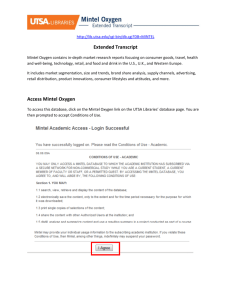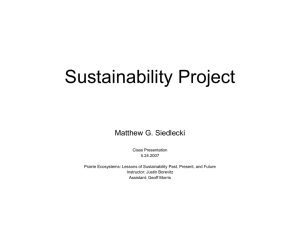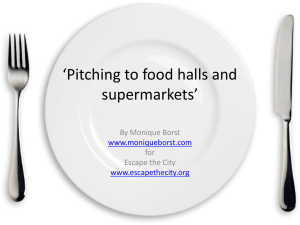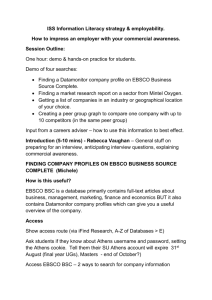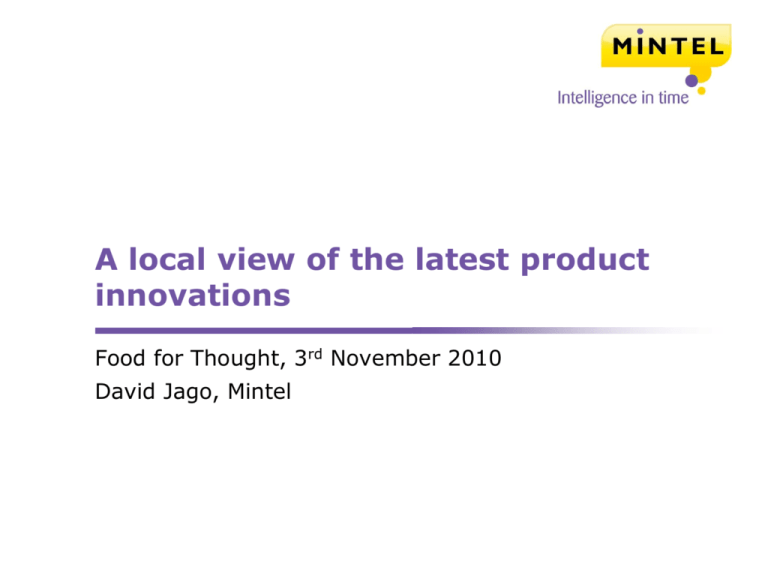
A local view of the latest product
innovations
Food for Thought, 3rd November 2010
David Jago, Mintel
Who we are
Mintel Inspire:
uncovering
consumer
drivers
Menu
Insights:
revealing
trends in
menus, flavors,
ingredients
GNPD:
tracking new
products
around the
world
Mintel
Research
Consultancy:
bringing it all
together
Mintel
Reports:
understanding
the “why”
behind the
trends
GNPD IRIS:
providing an
understanding
of product
success
Product
Retrieval:
delivering
products to
your door
1
© 2010 Mintel International Group. All rights reserved. Confidential to Mintel.
Today’s presentation
What can companies learn from innovation in other markets?
What’s happening now in key consumer trends, and how is new
product development responding?
How should companies be developing new products?
Which directions to take?
Which product attributes to focus on?
2
© 2010 Mintel International Group. All rights reserved. Confidential to Mintel.
What’s happening in New Product Development?
Recession or no recession, NPD patterns have always been sporadic
NPD in drink appears to be shrinking – down to just 12% of all NPD
in the current year
New product introductions, UK & Ireland
Source: Mintel GNPD
3
© 2010 Mintel International Group. All rights reserved. Confidential to Mintel.
Product development and innovation
Innovation drives growth…
But the food and drink industry is conservative
Because the consumer is inherently conservative
Breakthrough innovation is sexy, but it is very rare
Commercial innovation can bring in the ££ or €€ just as effectively
A quick look back at just a few recent launches…
4
© 2010 Mintel International Group. All rights reserved. Confidential to Mintel.
New in breakfast cereals
5
Running counter-trend?
Opting for balance?
Kellogg’s Krave – new in a
category where children, women
and health claims dominate
Weetabix chocolate – indulgent,
but half the sugar and low salt
© 2010 Mintel International Group. All rights reserved. Confidential to Mintel.
New in chocolate
6
A little “better for you”?
What’s premium nowadays?
Twix Fino – a lighter version with
wafer, 94 calories per piece
Cocopia luxury artisan chocolates
– from Tesco
© 2010 Mintel International Group. All rights reserved. Confidential to Mintel.
New in meal solutions
Simple, quality, convenience
Stretching values “safely”
Birds Eye Simply Bake To
Perfection – convenient, premium
quality proposition
Birds Eye Levi Roots Reggae
Reggae Beef Burgers – bringing
fun and variety to a staple
7
© 2010 Mintel International Group. All rights reserved. Confidential to Mintel.
A focus on key trends in food and drink
Staying close to home – looking at the UK and Irish markets
What motivates consumers?
Where is all the resource and effort being spent, developing and
launching new products?
8
© 2010 Mintel International Group. All rights reserved. Confidential to Mintel.
Which food matters matter?
Importance of food related claims to UK consumers
Animal welfare
British/GB origin
Free from (e.g. additives)
UK local/regional origin
Fairtrade
Carbon footprint
Traceability
Organic
Brand
Detailed origin of foreign food
None of these
0
5
10
15
Base: 1,000 Internet users aged 16+, December 2009
NB Respondents were limited to three choices.
Source: Toluna/Mintel
9
© 2010 Mintel International Group. All rights reserved. Confidential to Mintel.
20
25
30
35
40
Health & wellness remains the single most important trend
But how consumers see health & wellness
is changing
10
Health & wellness: shifting definitions
Low-in claims remain important, but
“dieting” and “weight loss” are replaced
by weight management and hunger
management
Portion control is emerging in some
markets as a key trend
Focus now is on “natural” nutrition:
Inherent goodness, fresh, wholesome,
balanced nutrition…
Wholegrain, superfruits, natural
antioxidants from fruit or cocoa…
“Natural” and “additive-free” become
part of the consumer’s wellness
vocabulary
11
Consumers avoid fat, and sugar, and additives…
UK consumers, 2009
40
40%
35
36%
36%
30
26%
25
20
15
10
5
0
I avoid fats
I am prepared
to pay more for
foods that don’t
contain artificial
additives
I avoid sugar
Source: TGI/Mintel
12
© 2010 Mintel International Group. All rights reserved. Confidential to Mintel.
I always look
for the
light/diet
versions of food
and drink
In NPD, traditional health claims are in long-term decline
New product introductions with selected claims, as %
total introductions, food & drink, UK & Ireland
50%
40%
30%
Minus
Plus
20%
10%
0%
2005
Source: Mintel GNPD
13
2006
2007
2008
2009
2010 YTD
Convenience, ethical & environmental claims take over…
New product introductions with selected claims, as %
total introductions, food & drink, UK & Ireland
Source: Mintel GNPD
14
But “natural” claims rule
New product introductions with selected claims, as %
total introductions, food & drink, UK & Ireland
Source: Mintel GNPD
15
No additives: from niche to mainstream
Raw Health organic crispbreads, UK,
made from raw ingredients, all
organic, gluten-free
Haagen-Dazs’ Five all natural ice
cream, USA, made with just five
ingredients listed front of pack
Sales of $21m in 1st year
16
© 2010 Mintel International Group. All rights reserved. Confidential to Mintel.
No additives: promoting the positive
Organix range with “no junk
promise”, UK
17
© 2010 Mintel International Group. All rights reserved. Confidential to Mintel.
Planet Lunch “100% natural”
kid’s range from Walkers, UK
No additives: communication built on simplicity, tradition
Charlie Bigham’s
range, UK:
packaging tells the
story, ingredients
statement is “clean”
18
© 2010 Mintel International Group. All rights reserved. Confidential to Mintel.
Organic
The market for organic food & drink
has suffered in the economic recession
Market values are flat or in decline
NPD is in decline (in the UK)
Other premium food segments have
not necessarily seen the same
downturn…
So how can brands (re)capture that
added value spend?
Is the answer in “more natural”
rather than organic-certified
products?
Or in greater differentiation?
Emphasis of provenance and
sustainability?
Or through “value with value”?
19
© 2010 Mintel International Group. All rights reserved. Confidential to Mintel.
Hipp baby food,
UK, “Great
Organic Value”
Organic – a tough market for the next few years
UK retail sales of organic food, 2003-13
£896m in 2003
20
© 2010 Mintel International Group. All rights reserved. Confidential to Mintel.
£1,883m in 2013
Sustainability hasn’t faded with the recession
21
It’s become part of everyday business
Heightened consumer
awareness and
expectation
Media coverage
Increased availability of
massmarket products that
address sustainability
Financial benefits of being
green for Corporates
22
Packaging: focus on materials reduction
41%
Bottle Green Squeezy
Squash, UK, triple
concentrated, easy
squeeze bottle
Kraft Foods’ Kenco
instant coffee
200g refill pouch,
UK, now with 97%
less packaging
weight than a
regular jar
23
Coca-Cola
Menos é Mais
Iced Tea
Concentrate,
Portugal, 1L
carton makes
7L drink
Of UK
consumers say
they would buy
more
environmentally
friendly products
if it saved them
money
Carbon footprints
Nearly one in five UK consumers claims an interest in carbon
footprint labelling…
Consumers seek clarity, any type of clarity, in a very complex issue
Quesos Forlasa cheese,
Spain, in CO2=0 package
24
© 2010 Mintel International Group. All rights reserved. Confidential to Mintel.
Casino (PL) potato
dishes, France, with
carbon index label
What if… water footprints?
Water conservation looks set to become the next big
issue
Major suppliers are addressing water usage
First “water footprints” appear on products
www.waterfootprint.org, a Unesco-run website,
provides water calculator and shows water usage for
diverse products
Ravintoraisio’s Elovena oat flakes,
Finland, packaging indicates total
water footprint (101L) per 100g
cereal; also carries carbon footprint
(80g per 100g)
25
© 2010 Mintel International Group. All rights reserved. Confidential to Mintel.
Fairtrade
Coffee, tea and chocolate still dominate, but
Fairtrade and Rainforest Alliance continue to
expand to new categories
18%
Fairtrade new product
introductions, by
category
27%
15%
7%
12%
Coffee
Tea
Chocolate Confectionery
21%
Non-alcoholic drinks
Mainstream brands enter the market, while
private label remains strong – accounting for
nearly a third of all NPD
26
© 2010 Mintel International Group. All rights reserved. Confidential to Mintel.
Bakery
Other
Fairtrade: new brands, new categories
Cadbury Dairy Milk chocolate, UK,
claimed to be the first mass
market chocolate producer to gain
certification from the Fairtrade
Foundation
27
Rude Health cereal with Fairtrade
banana, UK; Bart Spices’ Black
Peppercorns, UK
© 2010 Mintel International Group. All rights reserved. Confidential to Mintel.
Animal welfare
RSPCA’s Freedom Food scheme is the best known
programme for animal welfare
Focus on farming, transportation and slaughter
2,800 members, including farmers, processors,
packers and hauliers
Covers over 530 million animals, more than 700
product lines
42% share of all UK duck production (Cherry Valley)
20% of pig production (all Coop Truly Irresistible pork
products are from Freedom Food, Hampshire-bred pigs)
Sainsbury’s saw a 164% increase in Freedom Food sales
in 2009
40% of UK consumers cite animal welfare as an
important food claim
Yet less than 3% of new food products launched in
the UK carry an animal welfare claim on-pack…
28
© 2010 Mintel International Group. All rights reserved. Confidential to Mintel.
Animal welfare
Little Dish chilled meals for kids,
UK; “fresh, natural food” sourced
from “British farms where the
animals are well cared for
29
Honeydrop flavoured waters, USA,
with organic honey from “free
bees” as a natural sweetener
© 2010 Mintel International Group. All rights reserved. Confidential to Mintel.
Traceability
Latte Lombardia’s Latte Milano milk, Italy, in a recyclable package and a
Supply Chain Traceability logo, which allows the company to monitor the
entire production process from cow to consumer; Kwetters free range eggs,
Netherlands, with a code printed on each egg that provides all details on the
provenance of that egg
30
© 2010 Mintel International Group. All rights reserved. Confidential to Mintel.
Traceability – or how multinationals can play at local
http://www.cokecorporateresponsibility.co.uk/journey-of-a-coke/trace-your-coke.aspx
31
© 2010 Mintel International Group. All rights reserved. Confidential to Mintel.
“Local” in the wider market
“I buy goods produced in my country whenever I can”
Source: GB TGI, Q1 Kantar Media UK Ltd 2005-10 (Oct-Sep)/Mintel
32
© 2010 Mintel International Group. All rights reserved. Confidential to Mintel.
Local or regional in food & drink
Local has an important emotional tag…
It can also mean lower CO2 emissions
In the UK, three times as many consumers care about whether their
food is locally sourced than whether it is organic
Important issues when buying food,
UK consumers
30
25
%
20
15
10
5
0
Locally sourced
Fairtrade
Source: Toluna/Mintel, December 2009
33
© 2010 Mintel International Group. All rights reserved. Confidential to Mintel.
Organic
Supporting local or regional food: Continental approaches
Berger Regional Optimal meat
products, Austria, using pork
sourced within a radius of 50km
from production, while the pig
fodder comes from the Danube area
of Austria, not from a South
American plantation
34
Orlait’s J’Aime le Lait d’Ici, France,
milk “from farms in our regions,
collected and packaged in France”
© 2010 Mintel International Group. All rights reserved. Confidential to Mintel.
Food origin important, but attention-worthy?
It’s important to know w hich region/country
the food comes from
Attitudes
towards food
origin,
December 2009
48
I pay attention to food origin
36
Food origin labelling can sometimes be
misleading
35
Price is more important than w here the
food comes from
27
I don’t pay much attention to food origin
26
I’m w illing to pay a bit more for food w ith
detailed provenance information (eg
regional)
20
I look for the Red Tractor label w hen
buying food
78,000 farmers
400
packers/mfrs
15
£10 bn p.a.
12
I pay attention to the EU food origin labels
The brand is more important than w here
the food comes from
8
None of these
8
Base: 1,000 Internet users aged 16+
0
35
10
Source: Toluna/Mintel
20
30
%
© 2010 Mintel International Group. All rights reserved. Confidential to Mintel.
40
50
60
Two in five buy British to support local business
I buy British to support local businesses
Attitudes towards
British food,
December 2009
40
39
I expect British food to be cheaper
I trust British food more than food from
overseas
37
Food sourced from Britain has a low er
carbon footprint
35
32
British food has a good reputation
There is not enough British food in my local
supermarket
28
I’m w illing to pay a bit more for British food
19
British produce tastes better
17
British food is expensive for w hat it is
17
British food is not as good as other
imported food
Sainsbury’s bread made
with British flour
2
Base: 1,000 Internet users aged 16+
None of these
12
0
10
Source: Toluna/Mintel
20
30
%
36
© 2010 Mintel International Group. All rights reserved. Confidential to Mintel.
40
50
Half the nation want local food - effortlessly
I buy local food w hen possible
I’d like more local foods at my supermarket
45
Local food is better for the environment
37
Local food is often over-priced
32
I buy local food to support local businesses
31
I w ould buy more local food if I could afford
it
26
The availability of local food has improved
26
I prefer local food because it's authentic
14
I seek out local food
13
I trust local food more than big brands
12
I prefer local food because it's different
Base: 1,000 Internet users
aged 16+
6
None of these
Source: Toluna/Mintel
15
0
10
20
30
%
37
Attitudes towards
local food, December
2009
48
© 2010 Mintel International Group. All rights reserved. Confidential to Mintel.
40
50
60
One in six are food origin enthusiasts
Target groups, December 2009
Base: 1,000 Internet users aged 16+
Origin
committed
17%
One in six people are food origin
enthusiasts
They pay attention to food origin
They are willing to pay more for
British and traceable food
Apathetic
48%
Origin
interested
35%
Source: Toluna/Mintel
38
© 2010 Mintel International Group. All rights reserved. Confidential to Mintel.
One in three are interested
Target groups, December 2009
Base: 1,000 Internet users aged 16+
Origin
committed
17%
Apathetic
48%
One in three stand out as above
average positive towards British
and local food
Origin
interested
35%
Source: Toluna/Mintel
39
© 2010 Mintel International Group. All rights reserved. Confidential to Mintel.
But unwilling to pay higher prices
in return
Brands need to leverage qualities
to differentiate and justify price
premium
Leveraging the “local” message: simple formulations
Sharpham Park Organic Spelt
Granola, made with pure British
wholegrain spelt milled in Somerset,
100% organic, ingredients travel “the
minimum number of food miles”
40
Glenilen Farm yogurt, handmade on
Alan and Valerie Kingston's family
farm in West Cork. “Absolutely no
additives”, premium glass pot
© 2010 Mintel International Group. All rights reserved. Confidential to Mintel.
Leveraging the “local” message: more complex recipes
Tanfield Food’s Sharrow Bray
gourmet food range, e.g. Country
Mushroom Soup “made with the
whitest of button mushrooms
combined with double cream from
cows grazed in Northumberland and
Durham”
41
Country Crest From the Farm
Shepherds Pie, a microwave
wholesome meal of minced Irish
lamb and root vegetables topped
with creamy Irish potato
© 2010 Mintel International Group. All rights reserved. Confidential to Mintel.
Local – the challenge of availability
All major supermarkets play an important role…
Tesco claims to stock around 3,000 local lines
Tesco aims for $1 billion sales of local products by 2011
“Local” means produced in the county where sold, or in a neighbouring one
Farm shops and farmer’s markets grew fast in early 2000s
Growing interest in food, provenance, quality, transparency…
Especially favoured by more affluent consumers and over-35s
Recessionary pressures since, but note boost from “staycation” trend and
trading up
Increase in online activity
Especially via portals of multiple suppliers e.g. localfoodadvisor.com, with
its 20-mile radius search facility
But: Only 14% of consumers shop at farmers’ markets and farm
shops, and just 13% seek out local food
Essential to take local food to where the mainstream shoppers are
Future opportunities
Half the population consider it important to know where food comes
from
But only one in three pay attention to food origin
Half the population say they buy local food where possible, but just
one in seven seek it out
Huge opportunity to translate interest into action…
Transformation of brands into experiences as a means of differentiation
Create stories, personality and engagement via brands
Local food concessions in supermarkets as retail theatre (e.g. Rowes pie
and pasty concessions in Asda stores in Cornwall)
Regular (local) sampling stands in store
Supermarkets tying in with local farmers’ markets
43
© 2010 Mintel International Group. All rights reserved. Confidential to Mintel.
Future opportunities
Need to engage the young…
Building engagement through high interest values such as animal welfare,
ethics and the environment
Consider the role of “new” media
Tackle the price issue: build value with values
Value for money works in both premium and economy
Convert the “origin interested”
Leverage PR and face-to-face communications at the local and regional
level
Focus on core brand values: transparency, authenticity, authority
44
© 2010 Mintel International Group. All rights reserved. Confidential to Mintel.
Thank you
David Jago
Director of Insight & Innovation
tel: +44 20 7606 4533
email: djago@mintel.com
45
© 2010 Mintel International Group. All rights reserved. Confidential to Mintel.

